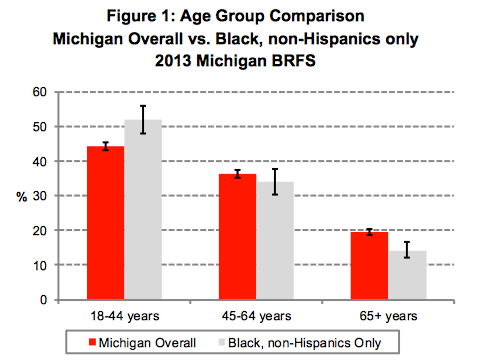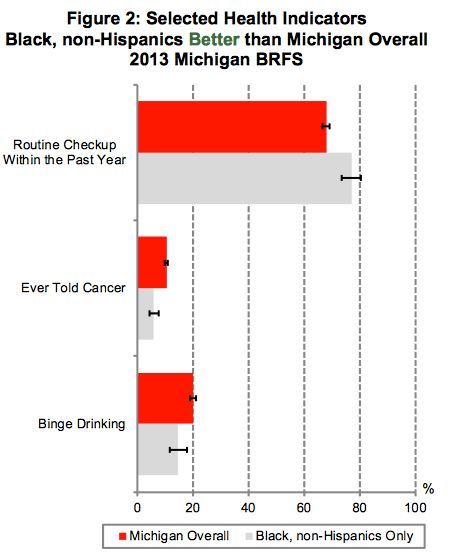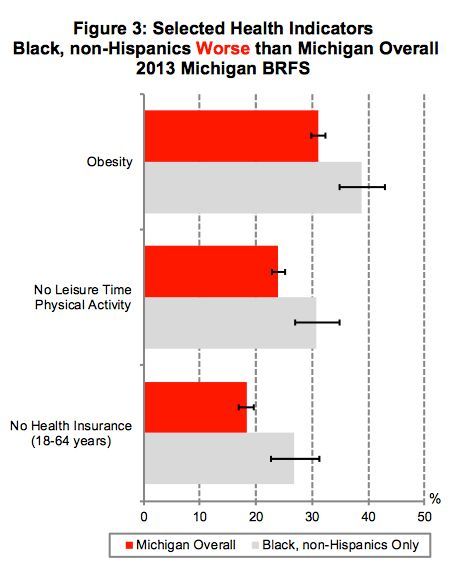HEALTH STATUS OF BLACK ADULTS IN MICHIGAN
Michigan Department of Community Health Releases New Fact Sheet
The Michigan Department of Community Health (MDCH), Chronic Disease Epidemiology and Health Disparities Reduction and Minority Health Sections would like to announce the release of a new fact sheet entitled “Health Status of Black, non-Hispanic Adults in Michigan.” The fact sheet details are below. A pdf can be downloaded here. Any questions related to the content of this fact sheet can be sent to MIBRFSS@michigan.gov.
Black, non-Hispanic adults experience poorer outcomes than the general population for many health conditions. Public health researchers are attempting to identify factors that underlie this disparity. This includes understanding the extent to which historic discrimination and limited access to social resources contribute to disparate health outcomes within this population. Data from the 2013 Michigan Behavioral Risk Factor Survey were used to characterize the current health status of Black, non-Hispanic adults in Michigan.
Black, non-Hispanic Adults vs. All Adults in Michigan
For 3 of the 26 health indicators analyzed,
Black, non-Hispanic adults reported doing better than all adults in Michigan. These indicators were having a routine checkup within the past year, binge drinking, and ever told to have cancer.
For 12 of the 26 health indicators analyzed,
Black, non-Hispanic adults reported doing worse than all adults in Michigan. Somea of these included: influenza vaccination within the past year, ever told to have high blood pressure, vegetable consumption, secondhand smoke exposure, poor general health, no health insurance, obesity (body mass index ? 30.0), and no leisure time physical activity.
For 11 of the 26 health indicators analyzed,
Black, non-Hispanic adults reported doing similar compared to all adults in Michigan.
Somea of these included: fruit consumption, ever told to have arthritis, high cholesterol, ever told to have diabetes, adequate physical activity, ever told to have depression, and cigarette smoking.
In 2013 (Figure 1),
- A higher proportion of Black, non-Hispanic adults in Michigan were between the ages of 18 and 44 years (51.9%) compared to all Michigan adults (44.3%).
- A smaller proportion of Black, non-Hispanic adults were 65 years or older (14.2%) compared to all adults statewide (19.5%) in 2013.
- Due to these differences, age-adjusted estimates were reported for this analysis.
When the health indicators for Black, non-Hispanic adults were compared to White, non-Hispanic adults in Michigan, the trend was very similar to all adults in Michigan*. Black, non-Hispanic adults reported doing worse for a couple of additional indicators and these included: ever told to have diabetes and ever told to have chronic obstructive pulmonary disease (COPD) .
* For a complete list of health indicators, reference the full report, “Health Risk Behaviors in the State of Michigan” at
www.michigan.gov/brfs.

In 2013 (Figure 2),
- Black, non-Hispanic adults (77.2%) reported a higher prevalence of having a routine health checkup within the past year compared to all Michigan adults (68.1%).
- A smaller proportion of Black, non-Hispanic adults (6.0%) reported ever being told to have cancer compared to all Michigan adults (10.5%).
- Black, non-Hispanic adults (14.7%) were less likely to report binge drinking within the past month compared to all Michigan adults (20.0%).

In 2013 (Figure 3),
- Black, non-Hispanic adults (38.8%) reported a higher prevalence of obesity (body mass index ? 30.0) compared to all Michigan adults (31.0%).
- A larger proportion of Black, non-Hispanic adults (30.8%) reported no leisure time physical activity within the past month compared to all Michigan adults (23.9%).
- Black, non-Hispanic adults between the ages of 18 and 64 years (26.8%) were more likely to report not having health insurance compared to all Michigan adults (18.3%).
The full list of health indicator estimates as well as survey methods are vailable in the complete report, “Health Risk Behaviors in the State of Michigan,” which can be found online at
www.michigan.gov/brfs.

Suggested Citation:
Fussman C, Hekman K, Weir S, Lyon-Callo S. 2015. Health Status of Black, non-Hispanic Adults in Michigan. Lansing, MI: Michigan Department of Community Health, Lifecourse Epidemiology and Genomics Division and Health Disparities Reduction and Minority Health Section.

